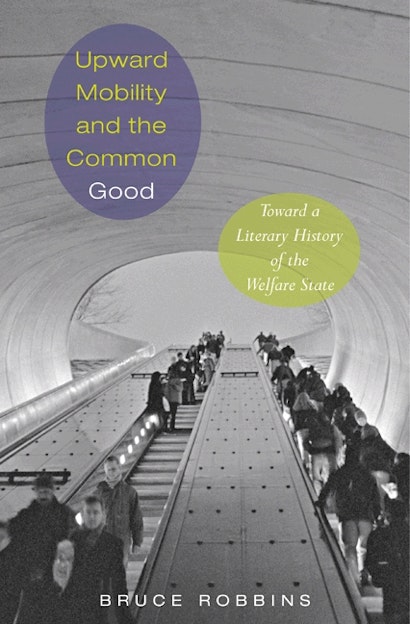We think we know what upward mobility stories are about—virtuous striving justly rewarded, or unprincipled social climbing regrettably unpunished. Either way, these stories seem obviously concerned with the self-making of self-reliant individuals rather than with any collective interest. In Upward Mobility and the Common Good, Bruce Robbins completely overturns these assumptions to expose a hidden tradition of erotic social interdependence at the heart of the literary canon.
Reinterpreting novels by figures such as Balzac, Stendhal, Charlotte Brontë, Dickens, Dreiser, Wells, Doctorow, and Ishiguro, along with a number of films, Robbins shows how deeply the material and erotic desires of upwardly mobile characters are intertwined with the aid they receive from some sort of benefactor or mentor. In his view, Hannibal Lecter of The Silence of the Lambs becomes a key figure of social mobility in our time. Robbins argues that passionate and ambiguous relationships (like that between Lecter and Clarice Starling) carry the upward mobility story far from anyone’s simple self-interest, whether the protagonist’s or the mentor’s. Robbins concludes that upward mobility stories have paradoxically helped American and European society make the transition from an ethic of individual responsibility to one of collective accountability, a shift that made the welfare state possible, but that also helps account for society’s fascination with cases of sexual abuse and harassment by figures of authority.
"Bruce Robbins's powerful case . . . is that every successfully self-bettering individual relies upon others, and that the limit example of such dependence is embodied in the welfare state."—Modern Language Quarterly
"Robbins's book makes a timely appearance, given the current interest in immigration and class mobility, especially in the U.S. Robbins carefully distinguishes his study of upward mobility stories, both fiction and nonfiction, from other work on the subject...Robbins's style is readable and energetic; his brisk, lucid analyses flow. His notes are informative, offering full publishing information about texts he used in researching and writing this interesting book."—J.A. Dompkowski, Choice
"[I]n its method and its claims, this highly original, elegantly written book deserves a wide audience; in its effort to recast our understanding of the (class) politics of American literary history, it merits the deepest interest of readers of these pages."—Lori Merish, American Literary History
"For some time upward mobility stories have been a pervasive element of U.S. political culture. This is the best book around for understanding the complexities of how they work."—Evan Watkins, Novel
"Upward Mobility and the Common Good is an original and important treatment of a crucially important topic."—Dan Bivona, Romanticism and Victorianism on the Net
"Robbins' Upward Mobility shows us what literary criticism, at its very best, can do. . . . [He] throws into relief what had been an overlooked line of argument in other critics' works."—Amanda Claybaugh, The Minnesota Review
"[A] groundbreaking work of political literary criticism. . . . His discussion of sociology as a combat sport, focused on the upward-mobility narratives of several distinguished sociologists, and on lowly origins as cultural capital, makes trenchant reading. . . . [O]ne of the more important books of the decade."—Judie Newman, Journal of American Studies
"A stylish and thought-provoking account of upward mobility stories and what they have to tell us about our emotionally complicated relation to the ideals of democracy and a welfare state. This is one of the most intellectually and politically stimulating books I have read in recent years."—Helen Small, University of Oxford
"Upward Mobility and the Common Good is a scintillating work of literary criticism that teaches us an entirely new way to think about the realities and myths of class mobility, and that serves to remind us of just how centrally class continues to figure in our most powerful and resonant narratives. Bruce Robbins is a shrewd and resourceful critic, an ingenious reader of plots, and a gifted writer. He offers us an account as lively as it is profound, and the precision and force of his observations along the way are hugely impressive."—James English, University of Pennsylvania
"This judicious and innovative study adds immeasurably to the cultural history of the modern welfare state. Moving with ease from English and European novels of the nineteenth century to a range of twentieth-century American works, Robbins finds in stories of upward mobility nothing less than the tacit foundations of our beleaguered liberalism. This will be an important book for some time to come."—Michael Szalay, University of California, Irvine

